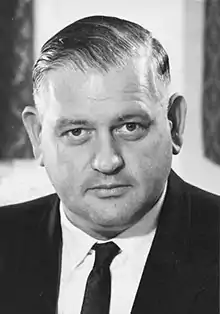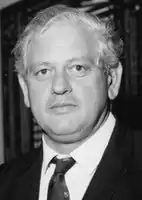1965 New Zealand Labour Party leadership election
The 1965 New Zealand Labour Party leadership election was held on 9 December 1965 to determine the future leadership of the New Zealand Labour Party. The election was won by Lyttelton MP Norman Kirk.
| |||||||||||||
| |||||||||||||
| |||||||||||||
Background
After Walter Nash retired as leader in 1963 Arnold Nordmeyer became Labour's 5th leader despite holding considerable public blame for Labour's loss of support after the "Black Budget.[1] The memory of the "Black Budget" still plagued Nordmeyer's profile and many within the party believed that it was time for a fresh start. In 1965 a group of younger Labour MPs formed a group who became dedicated to replace Nordmeyer with Kirk, becoming known as the "Mafia".
Candidates
Arnold Nordmeyer
Nordmeyer had led Labour since Nash's retirement nearly three years earlier. He led them in the 1963 election where Labour's vote increased slightly, but still did not perform well enough to win office. Some within Labour's caucus were of the opinion that Nordmeyer was too distant and out of touch with his colleagues and vice versa.[2] The younger Norman Kirk eventually emerged as the favourite candidate to succeed Nordmeyer as leader.
Norman Kirk
Kirk first entered parliament in 1957. Gradually, he began to rise through Labour's internal hierarchy, becoming vice-president of the Party in 1963 and president in 1964.[3] Other MPs often saw Kirk as a champion for ordinary New Zealanders via his working-class background at a time when ordinary voters saw many other politicians, such as Nordmeyer, out-of-touch and aloof.[3]
Result
A caucus vote was held on 9 December 1965 where Nordmeyer was defeated by Kirk 25 votes to 10.[1] Nordmeyer's deputy leader, Hugh Watt, retained his position despite the change in leadership receiving 24 votes against a combined total of 10 votes for the other two nominees.[4]
Leadership ballot
| Candidate | Votes | % | |
|---|---|---|---|
| Norman Kirk | 25 | 71.42 | |
| Arnold Nordmeyer | 10 | 28.58 | |
| Majority | 15 | 42.85 | |
| Turnout | 35 | N/A | |
Deputy-leadership ballot
| Candidate | Votes | % | |
|---|---|---|---|
| Hugh Watt | 24 | 70.58 | |
| Arthur Faulkner | 8 | 23.52 | |
| Norman Douglas | 2 | 5.88 | |
| Majority | 16 | 47.05 | |
| Turnout | 34 | N/A | |
How each MP voted
A list of each MP's vote.[5][6]
| MP | Leader Vote |
|---|---|
| Phil Amos | Kirk |
| Basil Arthur | Kirk |
| Ron Bailey | Kirk |
| Paddy Blanchfield | Kirk |
| Mick Connelly | Nordmeyer |
| Norman Douglas | Kirk |
| Jim Edwards | Nordmeyer |
| Arthur Faulkner | Kirk |
| Bill Fraser | Kirk |
| Warren Freer | Kirk |
| Martyn Finlay | Kirk |
| Bill Fox | Kirk |
| Mabel Howard | Kirk |
| Norman King | Kirk |
| Norman Kirk | Kirk |
| Ethel McMillan | Nordmeyer |
| Brian MacDonell | Kirk |
| Ritchie Macdonald | Kirk |
| Robert Macfarlane | Nordmeyer |
| Rex Mason | Nordmeyer |
| Jock Mathison | Nordmeyer |
| Henry May | Nordmeyer |
| Mick Moohan | Kirk |
| Colin Moyle | Kirk |
| Walter Nash | Kirk |
| Arnold Nordmeyer | Nordmeyer |
| Bill Rowling | Nordmeyer |
| Matiu Rata | Kirk |
| Iriaka Ratana | Kirk |
| George Spooner | Kirk |
| Eruera Tirikatene | Kirk |
| Bob Tizard | Kirk |
| Steve Watene | Kirk |
| Hugh Watt | Kirk |
| Stanley Whitehead | Nordmeyer |
Aftermath
Kirk's new enthusiastic leadership brought about a gradual rejuvenation in Labour's popularity. He suffered narrow election losses in 1966 and 1969 elections before finally winning office and becoming Prime Minister in 1972 election. Nordmeyer remained in Parliament for another four years, moving to the backbenches and becoming an elder statesman of the party. He retired at the 1969 election.[1]
Notes
- Brown, Bruce. "Nordmeyer, Arnold Henry". Dictionary of New Zealand Biography. Ministry for Culture and Heritage. Retrieved 18 September 2015.
- Hayward 1981, p. 56.
- Bassett, Michael. "Kirk, Norman Eric". Dictionary of New Zealand Biography. Ministry for Culture and Heritage. Retrieved 8 November 2012.
- Grant 2014, p. 85.
- Freer 2004, p. 137.
- Grant 2014, p. 84.
References
- Grant, David (2014). The Mighty Totara: The life and times of Norman Kirk. Auckland: Random House. ISBN 9781775535799.
- Hayward, Margaret (1981). Diary of the Kirk Years. Auckland: Reed Publishing. ISBN 0589013505.
- Freer, Warren (2004). A Lifetime in Politics: the memoirs of Warren Freer. Wellington: Victoria University Press. ISBN 0-86473-478-6.
- Logan, Mary (2008) [First ed. published 2008]. Nordy, Arnold Nordmeyer a political biography (1 ed.). Wellington: Steele Roberts Publishers. ISBN 978-1-877448-33-1.

.jpg.webp)
